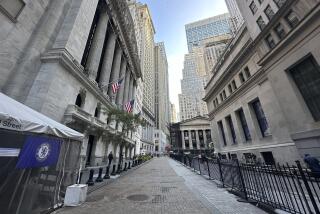Ben Bernanke shows how to chill markets by stating the obvious
How much of the stock market is made up purely of hot air?
I’m guessing 4%.
That’s roughly how much the Dow Jones Industrial Average lost in sell-offs Wednesday and Thursday before it leveled off Friday. Analysts say the drop was precipitated by Federal Reserve Chairman Ben S. Bernanke saying that the Fed just might start lifting its foot off the monetary gas pedal before the end of 2013. He was talking about the Fed’s latest, $85-billion-a-month bond-buying program, a.k.a. quantitative easing, which tries to push interest rates lower on mortgages and other long-term loans.
The Fed had previously said it would end the program when the unemployment rate hit 7%, and it hasn’t changed its position. Bernanke caught the financial market’s attention, though, when he said that economic projections were encouraging enough to suggest that the Fed could start tapering off the bond buying later this year in anticipation of unemployment declining to 7% by mid-2014.
Every investor on the planet knew (or should have known) that the Fed would stop buying bonds eventually, just as investors know that the Fed will eventually raise its target for short-term interest rates. These steps will tighten the supply of money, potentially slowing the economy. They’ll also take some of the wind out of Wall Street’s sails, in part because it will be more expensive for investors and businesses to gamble with borrowed cash.
Those days are still a ways off, especially considering the Fed’s stance on short-term rates. The Federal Open Markets Committee reiterated Wednesday that it expects its target will remain at 0 to .25% “at least as long as the unemployment rate remains above 6.5%, inflation between one and two years ahead is projected to be no more than a half percentage point above the committee’s 2% longer-run goal, and longer-term inflation expectations continue to be well anchored.”
So what got into the markets?
Some analysts contend that the Dow’s gains over the past four years have been built with the help of the Fed’s easy-money policies and that the bubble will burst when the policies change and interest rates return to more conventional levels. If you think that the economy can’t survive without the Fed’s stimulus, then Bernanke’s statement was a splash of ice-cold water, even if you could see it coming. The shock was in actually getting hit.
There was some sentiment at the Fed that now was not the time for Bernanke to show more of his hand. One of his colleagues on the open markets committee, St. Louis Federal Reserve Bank President James Bullard, issued a statement saying that “a more prudent approach would be to wait for more tangible signs that the economy was strengthening and that inflation was on a path to return toward target before making such an announcement.” It added, “Policy actions should be undertaken to meet policy objectives, not calendar objectives.”
In other words, there’s some rational fear about what might happen later this year if the Fed starts to ease the downward pressure it’s been placing on interest rates.
It’s worth remembering, though, that investors base their decisions not just on economic realities, but on their expectations for how other investors will behave. The question Wednesday and Thursday wasn’t just whether the Fed’s actions would hurt the economy. We won’t know that until the Fed, you know, acts. It also was whether the news was big enough to cause a sell-off, and if so, how big it would be.
Markets often react to expected events before they happen because of investors’ desire to be ahead of the pack. In this case, the front-runners appear to have burned off 4% of the value of the Dow. The fact that the market didn’t fall further suggests that investors are pretty confident that the gains up to that point are sustainable. Either that or investors think the pack will remain irrationally exuberant until the Fed actually stops buying bonds.
ALSO:
A tax system that targets workers
Did Obama dis Catholic schools in Belfast?
Follow Jon Healey on Twitter @jcahealey
More to Read
A cure for the common opinion
Get thought-provoking perspectives with our weekly newsletter.
You may occasionally receive promotional content from the Los Angeles Times.











